23 Apr2021
By Linda Minor
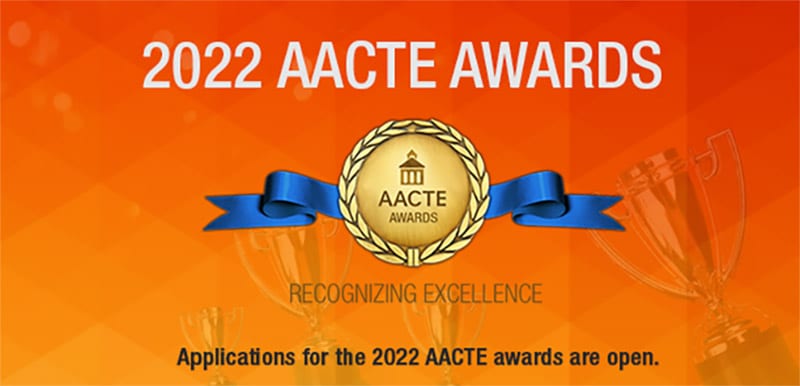 AACTE wants to recognize individuals and institutions for significant contributions to the field of educator preparation. Applications for the 2022 AACTE awards are now open. For most of the awards, programs and individuals can be either self-nominated or nominated by a third party. To submit your nomination, visit AACTE’s online submission site.
AACTE wants to recognize individuals and institutions for significant contributions to the field of educator preparation. Applications for the 2022 AACTE awards are now open. For most of the awards, programs and individuals can be either self-nominated or nominated by a third party. To submit your nomination, visit AACTE’s online submission site.
In identifying notable programs, practices, activities, writing, and research, these awards encourage all member institutions to strengthen the profession of teacher preparation through innovation, high standards, and leadership.
Entries for the Outstanding Book Award are due May 14 and entries for the Outstanding Dissertation Award are due August 20. The due date for all other award submissions is October 8.
23 Apr2021
By Nicole Dunn
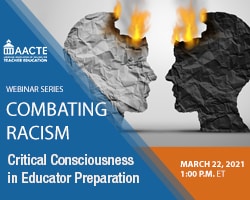 Asian American educator Elizath Kleinrock described her mindset after the reading about the anti-Asian hate crimes in Atlanta last March as, “[un]able to express my sadness, frustration and rage … how could I face my students in class when my body and voice are noticeably shaking?” With anti-Asian hate crimes up 149% in major cities due to increased negative stereotyping amidst the COVID-19 pandemic, the educator preparation community must increase its awareness and efforts by teaching true allyship in U.S. schools and communities.
Asian American educator Elizath Kleinrock described her mindset after the reading about the anti-Asian hate crimes in Atlanta last March as, “[un]able to express my sadness, frustration and rage … how could I face my students in class when my body and voice are noticeably shaking?” With anti-Asian hate crimes up 149% in major cities due to increased negative stereotyping amidst the COVID-19 pandemic, the educator preparation community must increase its awareness and efforts by teaching true allyship in U.S. schools and communities.
In AACTE’s next Combating Racism in Educator Prep series webinar, a distinguished panel will guide a conversation that addresses the often-omitted civil rights history of the Asian American and Pacific Islander (AAPI) here in the United States and resources for teaching that history and why it’s essential in our collective fight to combat systemic racial oppression in our education system. AACTE is ready to seize this present moment to respond to Anti-AAPI racism as an association and hopes you join in these efforts.
Register today to attend the webinar on April 29, 3:30 p.m. EST.
19 Apr2021
By David Fuentes and Amy Ginsberg
In the following article, David A. Fuentes and Amy Ginsberg of the College of Education at William Paterson, a member of AACTE’s Network Improvement Community (NIC) Black and Hispanic/Latino Male Teacher Initiative, take a deep dive into their efforts to increase dual enrollment opportunities as a preemptive recruitment strategy. They provide insight into how network improvement science can be used to identify levers within education preparation program systems that can improve recruitment and retention of diverse teacher candidates.
To learn more about NIC members’ initiatives to recruit and retain Black and Latina males, watch the Building Recruitment Pathways, a segment of AACTE’s new NIC video case studies series.
Building and Sustaining Recruitment Pathways for Black and Latino Male Teachers
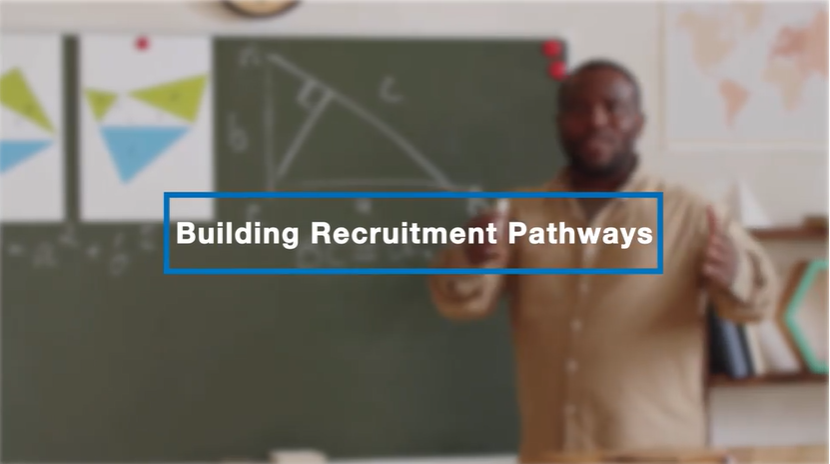 In 2014, our College of Education at William Paterson University, a Hispanic Serving Institution (HSI) and Minority Serving Institution (MSI), located in the greater New York City area, was selected as one of ten universities to participate in the AACTE Network Improvement Community (NIC), aimed at increasing the number of Black and Latino/Hispanic male teachers (BLMs). Since that time, we have been engaged in iterative cycles of plan-do-study-act (PDSA). This systematic research first led to our becoming NIC mindful and then to several structural changes in our College of Education that make our efforts aimed at teacher diversification more possible today in both theory and practice. We have uncovered, implemented, and tested the efficacy of several structural changes at our institution targeting key drivers, recruitment and retention, while implementing new structures based on network improvement science and our desire and commitment to diversify our teacher candidate pool.
In 2014, our College of Education at William Paterson University, a Hispanic Serving Institution (HSI) and Minority Serving Institution (MSI), located in the greater New York City area, was selected as one of ten universities to participate in the AACTE Network Improvement Community (NIC), aimed at increasing the number of Black and Latino/Hispanic male teachers (BLMs). Since that time, we have been engaged in iterative cycles of plan-do-study-act (PDSA). This systematic research first led to our becoming NIC mindful and then to several structural changes in our College of Education that make our efforts aimed at teacher diversification more possible today in both theory and practice. We have uncovered, implemented, and tested the efficacy of several structural changes at our institution targeting key drivers, recruitment and retention, while implementing new structures based on network improvement science and our desire and commitment to diversify our teacher candidate pool.
16 Apr2021
By Kari Vogelgesang
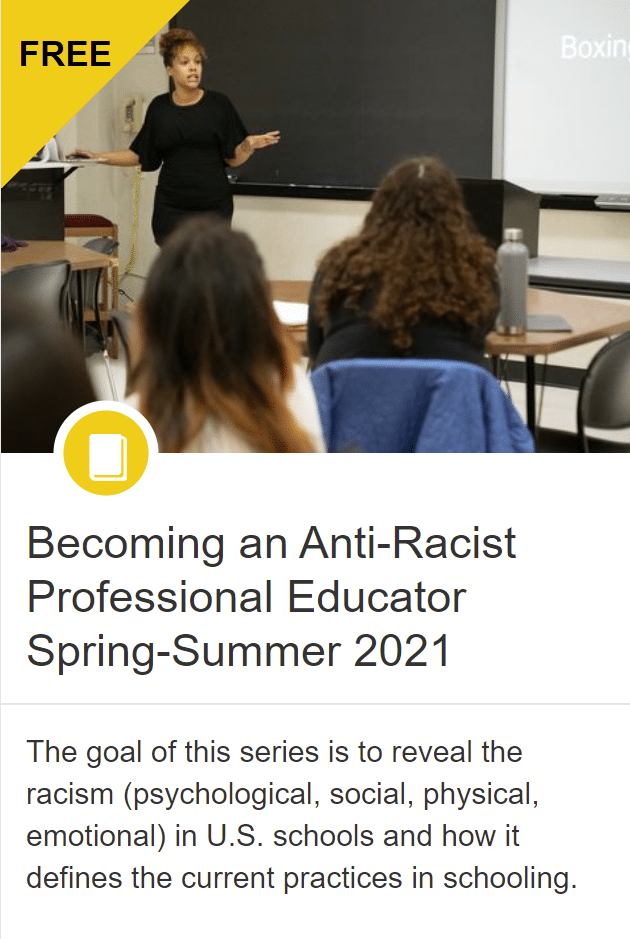 The Baker Teacher Leader Center in the College of Education at the University of Iowa is hosting an Anti-Racism Professional Educator Webinar Series. The goal of this series is to reveal the racism (psychological, social, physical, emotional) in U.S. schools and how it defines the current practices in schooling. We will explore the kinds of changes school personnel must make in their interactions, engagement, and environment to work towards anti-racism. In this series, we will decenter Whiteness and interrogate your positionality within society, but specifically within schools.
The Baker Teacher Leader Center in the College of Education at the University of Iowa is hosting an Anti-Racism Professional Educator Webinar Series. The goal of this series is to reveal the racism (psychological, social, physical, emotional) in U.S. schools and how it defines the current practices in schooling. We will explore the kinds of changes school personnel must make in their interactions, engagement, and environment to work towards anti-racism. In this series, we will decenter Whiteness and interrogate your positionality within society, but specifically within schools.
Educators who register for and attend all nine sessions in the series will earn one free teacher license renewal credit! Register here for the credit. This credit has been pre-approved for state of Iowa teachers. If you live outside the state of Iowa, please contact your administration or board of educational examiners for approval. If you have missed the first few sessions, and are still interested in earning licensure renewal credit, please contact the Baker Teacher Leader Center at tlc@uiowa.edu.
Kari Vogelgesang is clinical associate professor; edTPA coordinator, El Ed & SpEd; and director, professional development at Baker Teacher Leader Center, College of Education, University of Iowa.
13 Apr2021
By K. Stanley Brooks
 Stanley Brooks of Chosen Path Consulting was one of three presenters of the 2021 Annual Meeting session, “Identifying, Understanding, and Replacing Racist Curricula.” In this article, Brooks expounds on the key questions for inquiry and reflection on what it means to engage in an anti-racist (not non-racist) manner in the academic space.
Stanley Brooks of Chosen Path Consulting was one of three presenters of the 2021 Annual Meeting session, “Identifying, Understanding, and Replacing Racist Curricula.” In this article, Brooks expounds on the key questions for inquiry and reflection on what it means to engage in an anti-racist (not non-racist) manner in the academic space.
The reader may perceive the title and guiding question as sarcastic, however, there’s a serious tone and authenticity to the question. If our curriculum is not already anti-racist, then what have we been allowing and promoting all these years? What thoughts and beliefs rooted in racial biases have many educators internalized as children, young adults, and seasoned professionals?
12 Apr2021
By Jacqueline Rodriguez
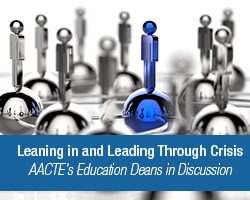 We learned so much from our education deans during the 2021 Annual Meeting that we are hosting a webinar on April 29 to dive deeper into leaning in and leading through the COVID-19 pandemic, and the impact of systemic racism on campus and within their communities.
We learned so much from our education deans during the 2021 Annual Meeting that we are hosting a webinar on April 29 to dive deeper into leaning in and leading through the COVID-19 pandemic, and the impact of systemic racism on campus and within their communities.
Educator preparation leaders, specifically, are managing the twin crisis of the COVID-19 pandemic and racial injustice within and across the nation’s institutions. We can all agree that the shift we experienced in our personal and professional lives as we witnessed horrific tragedies grounded in racism and discrimination continues to rock our schools and communities. As equity-minded leaders, three deans addressed faculty and student needs by starting with empathy and ending with action.
09 Apr2021
By Amanda Morales
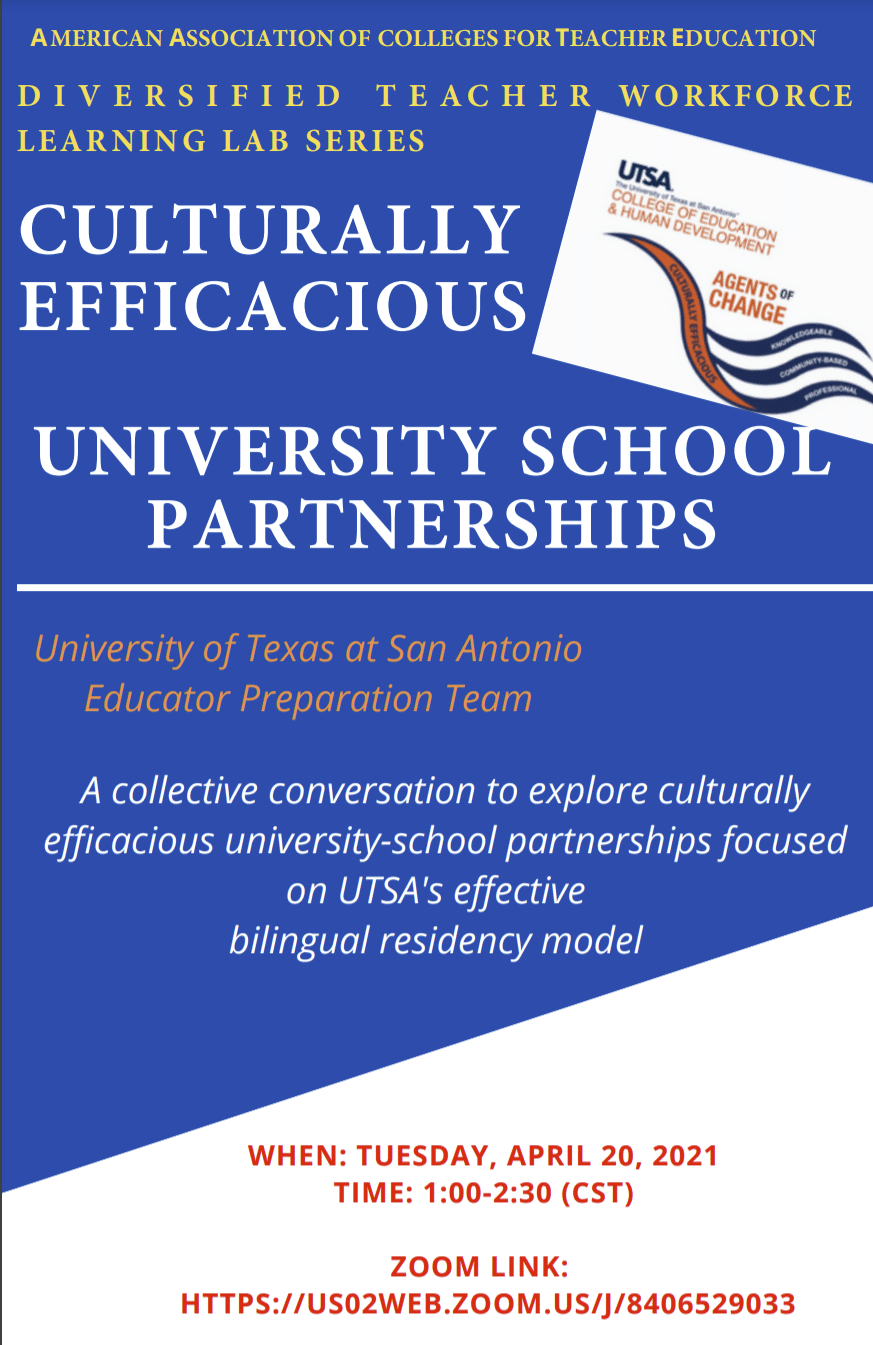 Join the AACTE Diversified Teacher Workforce Topical Action Group (TAG) Learning Lab on Building Culturally Efficacious University-School Partnerships on Tuesday April 2O, 1:00 -2:30 p.m. (CST) via the Zoom: https://us02web.zoom.us/j/8406529033
Join the AACTE Diversified Teacher Workforce Topical Action Group (TAG) Learning Lab on Building Culturally Efficacious University-School Partnerships on Tuesday April 2O, 1:00 -2:30 p.m. (CST) via the Zoom: https://us02web.zoom.us/j/8406529033
Across the field of education (PK-20) students, teachers, administrators, professors, and program leaders continue to witness and lament the chronic disparities in representation and lack of ethno-racial and linguistic diversity among teachers (relative to their students) in our nation’s schools. And in the wake of a global pandemic, enduring civil unrest, and calls for racial justice related to systemic anti-Blackness and anti-immigrant within all aspects of society, educational institutions are being forced to engage in introspection with greater magnitude. Teacher preparation programs in particular are feeling increased pressure to recruit, retain, and effectively prepare a highly-qualified, racially-literate, diverse pool of candidates as districts scramble to hire teachers with the content knowledge and pedagogical skills as well as the cultural and linguistic competencies needed to meet the needs of their increasingly diverse student populations.
06 Apr2021
By Nicole Dunn
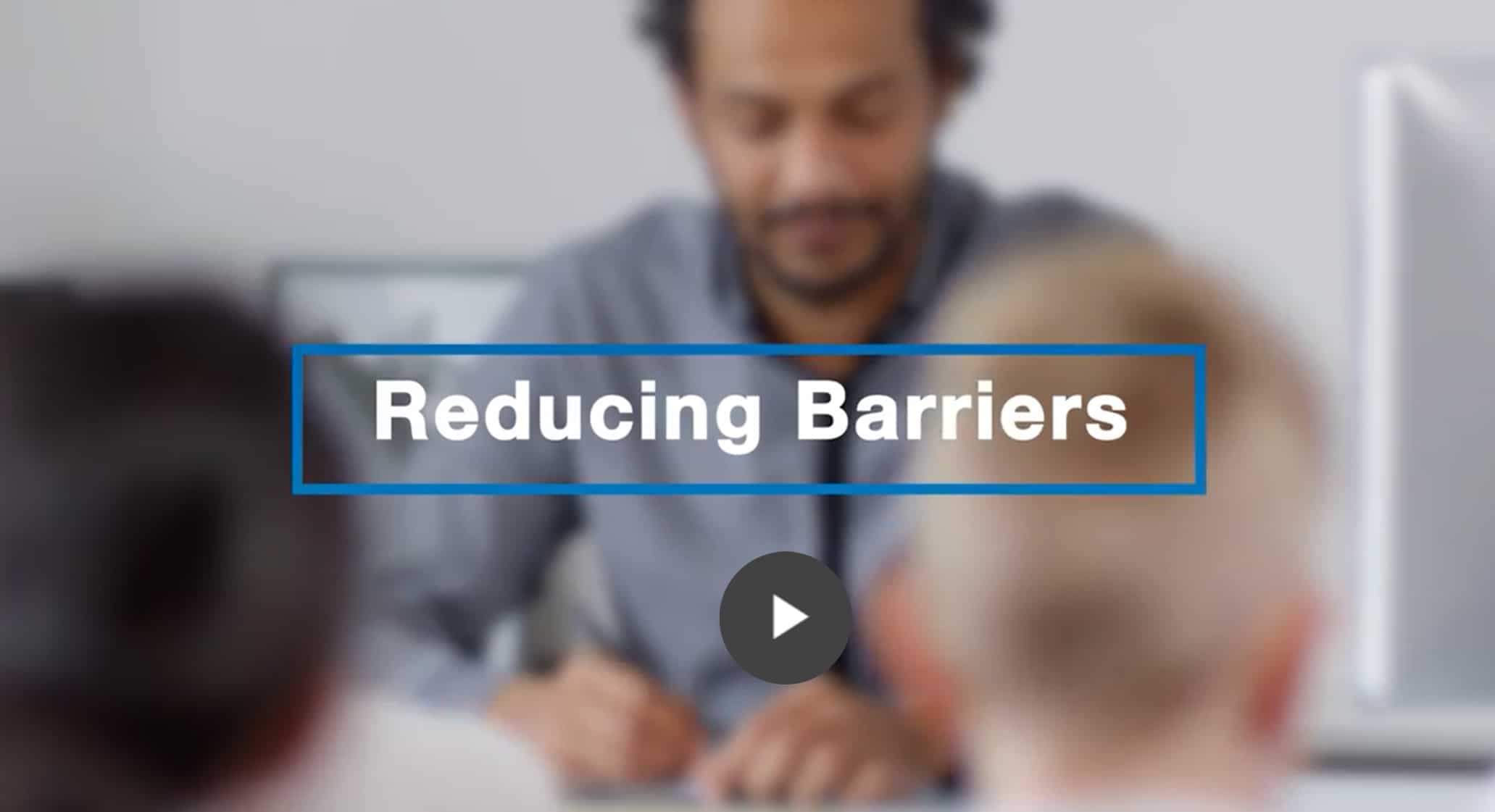
With the exacerbation of our nation’s teacher shortage brought on by the pandemic, the new White House administration will need to address this crisis strategically, keeping equity top of mind. As AACTE looks forward to improving the capacity and representation in the teacher workforce, it is essential for policy makers to tie decisions back to the historical context of structural oppression that has created barriers for a diverse teacher workforce in the past. As part of the AACTE Network Improvement Community (NIC) Black and Hispanic/Latino Male Teacher Initiative, NIC members identified a number of barriers and solutions to these obstacles, which are highlighted in Reducing Barriers, a segment of AACTE’s new NIC video case studies series.
30 Mar2021
By Gaelle Gilbert
During the Washington Post Live’s webinar, “U.S. Higher Education: Rethinking the Possibilities,” AACTE’s Dean in Residence Leslie Fenwick, dean emeritus of Howard University School of Education, was interviewed by Eugene Scott as the first of the two guests. The interview was comprised of questions covering different facets of the education space including policy, diversity, student loans, and the pandemic.
The first question addressed President Joe Biden and what Fenwick believed should be his top priority in regard to education policy. Fenwick response focused on embracing a new and more diverse student population both in the workforce and higher education. She delved into specifics of the increasing majority of non-White students in public schools beginning in 2018 and continuing on an upward trajectory.
26 Mar2021
By AACTE
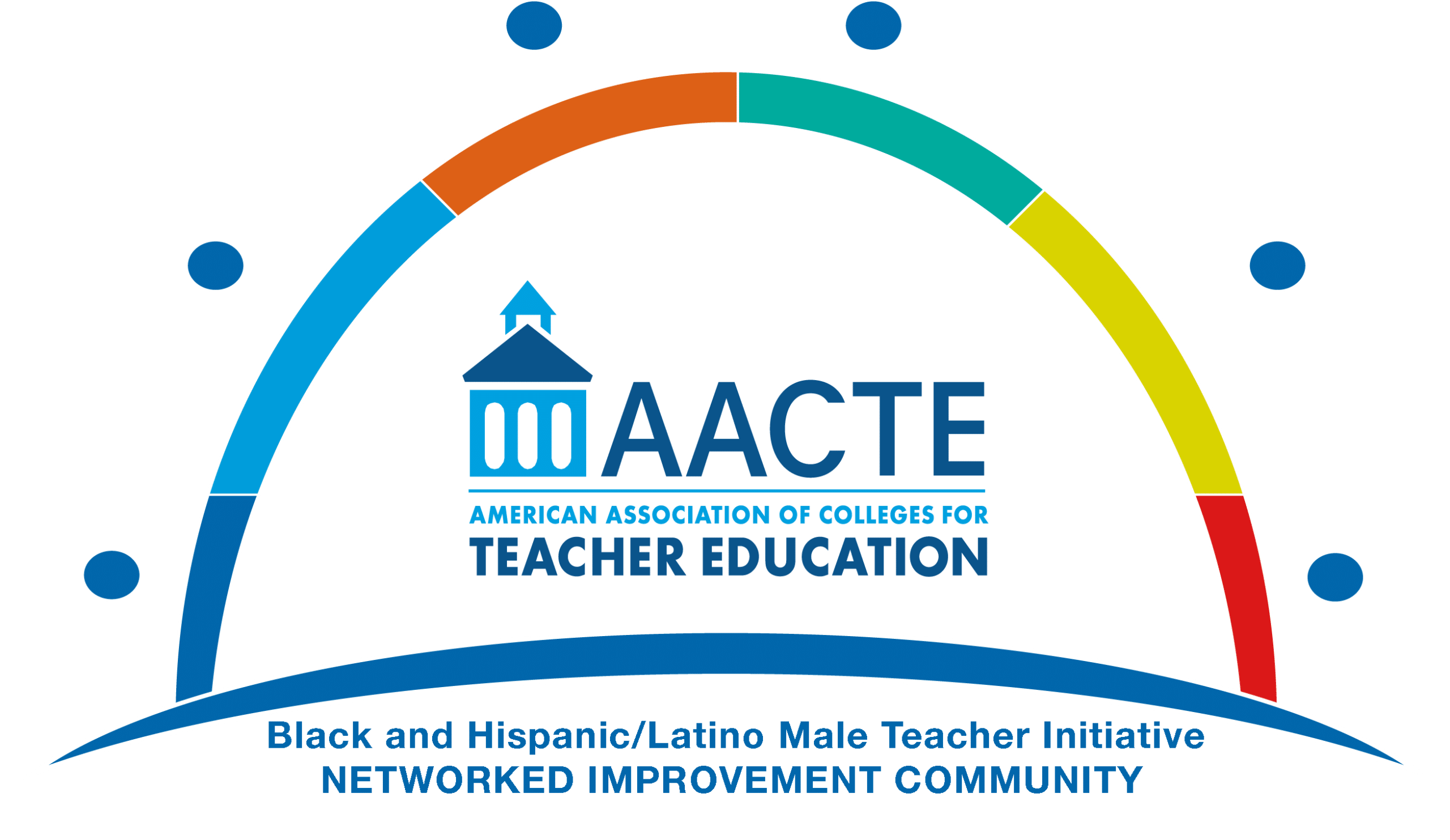
The American Association of Colleges for Teacher Education (AACTE) released today its new video series featuring promising practices for recruiting and retaining male teachers of color. AACTE created the Black and Hispanic/Latino Male Teacher Initiative Networked Improvement Community (NIC), which included a 5-year study by 10 AACTE member institutions that implemented improvement science to address the shortage crisis of Black and Hispanic/Latino profession-ready male teachers. Key findings from their research are featured in the video case studies, where the NIC participants present their experiences and lessons learned. NIC members describe effective ways for reducing barriers, developing partnerships, building recruitment pathways, providing mentorship, and offering faculty training to diversify the profession.
25 Mar2021
By Dawn Williams
Howard University is pleased to announce its recent endorsement by the College Board to host an Advanced Placement Summer Institute in 2021. The Howard University School of Education is committed to increasing the diversity of AP educators and high school students enrolled in these courses. APSI@Howard will offer 2 cohorts for new and experienced AP teachers during the weeks of July 19-23, 2021 and July 26-30, 2021.
Our virtual AP Summer Institute will bring part of the Howard experience to AP teachers worldwide. Throughout the institute, educators will receive intensive training on the curriculum and teaching methods of AP courses while also being exposed to modules around implicit bias and anti-racist teaching and pedagogical approaches. Each workshop will include an experiential learning opportunity related to the field with the intent of modeling instruction. The workshops will allow teachers the opportunity to interact with colleagues and discuss concerns surrounding the AP courses they will teach. Please feel free to pass this information along to school and district leaders as well as high school teachers.
APSI @ Howard University is now accepting registrations.
July 19-23, 2021 Week 1 registration
July 26-30, 2021 Week 2 registration
Dawn Williams is the Dean of the Howard University School of Education.
16 Mar2021
By Candace Johnson and Michael Douglas

Houston Endowment has awarded Prairie View A&M University’s Whitlowe R. Green College of Education (WRGCOE) one of the college’s largest grants in its 141-year history. The foundation is investing $1.5 million in the College to support PVAMU’s Educator Preparation Program, increasing the number of qualified teachers of color and preparing the educators for long-term success. The grant is part of $20M in funds the Houston Endowment awarded to several Houston area organizations committed to making racial equity and social justice in Houston a reality.
15 Mar2021
By Nicole Dunn
 AACTE is honored to welcome three panelists from member institution Rowan University to lead its next webinar in the Combating Racism in Educator Preparation Series. For this installment, Monika Shealey, Shelley Zion, and Beatrice Carey, who are among those leading the creation and implementation of Rowan’s DEI certificate program, will teach participants to tune into their critical consciousness to sustain a lifelong commitment to addressing structural oppression.
AACTE is honored to welcome three panelists from member institution Rowan University to lead its next webinar in the Combating Racism in Educator Preparation Series. For this installment, Monika Shealey, Shelley Zion, and Beatrice Carey, who are among those leading the creation and implementation of Rowan’s DEI certificate program, will teach participants to tune into their critical consciousness to sustain a lifelong commitment to addressing structural oppression.
The Critical Consciousness in Educator Preparation webinar will take place on Monday, March 22, 1:00-2:15pm EST. In this interactive webinar, attendees will learn and practice several foundational strategies based on the certificate program modules. Whatever your role and wherever you are on the lifelong path of being a genuinely antiracist, abolitionist, and intersectional educator, you will benefit from this webinar as either a starting or reflective framework for the individual educator to live and promulgate these values through the field.
15 Mar2021
By Danna Demezier
AACTE presented a Deeper Dive session on February 24, 2021 at its 73rd Annual Meeting, “Leading in the Time of Crisis: Responding to COVID-19 and Social Justice Movements.” This panel discussion, moderated by AACTE’s Vice President of Research, Policy, & Advocacy Jacqueline Rodriguez, explored the leadership responses of three education deans to the national and racial pandemic. Although the issues raised were not easy to navigate, each dean highlighted specific strategies and intentional efforts made at their respective institution, which demonstrated the keen ability to lead with justice, compassion, and action. In listening to their responses, I noted that each response matched one of John C. Maxwell’s quote for leadership success, “Everything rises and falls on leadership.”
Jacqueline Rodriguez described the deans as equity-minded leaders who start off with empathy and maintain their efforts through action.
12 Mar2021
By John McDonald

This article originally appeared in Ampersand, the UCLA Ed & IS online magazine, and is reprinted with permission.
The Center for the Transformation of Schools at the UCLA School of Education and Information Studies is launching a new research initiative to inform and strengthen efforts to increase the racial, cultural and linguistic diversity of educators in California.
The project will bring together expert researchers and K-12 and higher education representatives from a variety of backgrounds to examine and identify the factors that fuel the gap in the racial identity of California’s educators and the students they serve. The research will produce an evidence-based landscape study of the challenge, as well as additional research and policy briefs that build public awareness and set forth strategies and models for state and local efforts to increase the diversity of the education workforce. The project is funded by a grant from the William & Flora Hewlett Foundation and from the Bill & Melinda Gates Foundation as part of a national effort to increase educator diversity.
 AACTE wants to recognize individuals and institutions for significant contributions to the field of educator preparation. Applications for the 2022 AACTE awards are now open. For most of the awards, programs and individuals can be either self-nominated or nominated by a third party. To submit your nomination, visit AACTE’s online submission site.
AACTE wants to recognize individuals and institutions for significant contributions to the field of educator preparation. Applications for the 2022 AACTE awards are now open. For most of the awards, programs and individuals can be either self-nominated or nominated by a third party. To submit your nomination, visit AACTE’s online submission site. 






 Asian American educator
Asian American educator 
 The Baker Teacher Leader Center in the College of Education at the University of Iowa is hosting an
The Baker Teacher Leader Center in the College of Education at the University of Iowa is hosting an  Stanley Brooks of Chosen Path Consulting was one of three presenters of the 2021 Annual Meeting session, “Identifying, Understanding, and Replacing Racist Curricula.” In this article, Brooks expounds on the key questions for inquiry and reflection on what it means to engage in an anti-racist (not non-racist) manner in the academic space.
Stanley Brooks of Chosen Path Consulting was one of three presenters of the 2021 Annual Meeting session, “Identifying, Understanding, and Replacing Racist Curricula.” In this article, Brooks expounds on the key questions for inquiry and reflection on what it means to engage in an anti-racist (not non-racist) manner in the academic space. We learned so much from our education deans during the 2021 Annual Meeting that we are hosting a webinar on April 29 to dive deeper into leaning in and leading through the COVID-19 pandemic, and the impact of systemic racism on campus and within their communities.
We learned so much from our education deans during the 2021 Annual Meeting that we are hosting a webinar on April 29 to dive deeper into leaning in and leading through the COVID-19 pandemic, and the impact of systemic racism on campus and within their communities. Join the AACTE Diversified Teacher Workforce Topical Action Group (TAG) Learning Lab on Building Culturally Efficacious University-School Partnerships on Tuesday April 2O, 1:00 -2:30 p.m. (CST) via the Zoom:
Join the AACTE Diversified Teacher Workforce Topical Action Group (TAG) Learning Lab on Building Culturally Efficacious University-School Partnerships on Tuesday April 2O, 1:00 -2:30 p.m. (CST) via the Zoom: 


